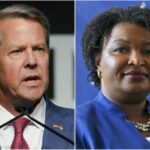Roanoke College Polls: Shaping Virginia’s Electoral Predictions
The Impact of Roanoke College Polls on Virginia’s Electoral Landscape
Roanoke College Polls have emerged as a significant player in shaping the electoral landscape of Virginia. The polls conducted by the college provide valuable insights into voter preferences and trends, offering a snapshot of the political climate leading up to elections. Candidates, political analysts, and the general public closely follow these polls to gauge the pulse of the electorate and adjust their strategies accordingly.
The impact of Roanoke College Polls extends beyond just predicting election outcomes. These polls have the power to influence voters’ perceptions, swaying undecided individuals and solidifying support for specific candidates. The data collected through these polls can shape not only the electoral strategies of political campaigns but also the broader discourse surrounding key issues and candidates in Virginia.
Understanding the Methodology Behind Roanoke College Polls
Roanoke College Polls employ a combination of telephone interviews and online surveys to gather data on voter preferences in Virginia. The polling sample is carefully selected to ensure representation from different demographic groups across the state. This methodology aims to capture a diverse range of perspectives and provide a comprehensive look at the political landscape.
In addition, Roanoke College Polls utilize statistical weighting techniques to adjust the data and account for any potential biases in the sample. This process helps to ensure that the results accurately reflect the broader population and improve the reliability of the polling data. By incorporating these rigorous methods, Roanoke College Polls strive to produce accurate and insightful insights into voter opinions and behaviors in Virginia.
Key Findings from Recent Roanoke College Polls in Virginia
In the most recent Roanoke College polls conducted in Virginia, the data revealed a tight race between the two leading gubernatorial candidates. The results indicated that the margin of difference between the contenders was within the poll’s margin of error, suggesting a highly competitive electoral landscape. Additionally, the polls highlighted a significant shift in voter sentiments towards key policy issues, signaling potential changes in the electorate’s priorities and concerns.
Furthermore, the Roanoke College polls shed light on the varying levels of support for different political parties across different regions of Virginia. The data unveiled distinct trends in voter preferences, with urban areas showing a stark contrast to rural communities in their political leanings. These findings provide valuable insights into the diverse political dynamics within the state and emphasize the importance of understanding regional nuances in shaping electoral strategies.
Comparing Roanoke College Polls to Other Polling Institutions
Roanoke College Polls have emerged as a significant player in the realm of electoral polling within Virginia. While there are various polling institutions operating in the state, Roanoke College Polls stand out for their methodological rigor and reputation for accuracy. This has positioned them as a trusted source of information for both political analysts and the general public seeking insights into voter sentiment.
In comparison to other polling institutions, Roanoke College Polls have consistently demonstrated a strong track record in predicting electoral outcomes. Their sampling techniques and survey methodologies have been lauded for their robustness and ability to capture the nuances of voter preferences. This has distinguished Roanoke College Polls as a reliable barometer of public opinion, contributing valuable insights to the electoral landscape in Virginia.
The Role of Roanoke College Polls in Shaping Voter Perception
Roanoke College Polls play a crucial role in shaping voter perception in Virginia. By providing regular updates on public opinion and electoral trends, these polls serve as a barometer for voter sentiment, influencing how individuals view candidates and political issues. The data and analysis presented by Roanoke College Polls are often cited by the media, politicians, and the general public, contributing to the formation of public discourse and awareness surrounding key electoral contests.
Moreover, the accessibility and transparency of Roanoke College Polls make them valuable tools for voters to gauge the political landscape. The detailed methodology and comprehensive reporting of these polls help voters make informed decisions based on current trends and dynamics within the state. As such, the influence of Roanoke College Polls extends beyond mere numbers, playing a significant role in shaping voter attitudes and behaviors leading up to elections.
Analyzing the Accuracy of Roanoke College Polls in Predicting Election Outcomes
Roanoke College polls have become a significant player in shaping Virginia’s electoral landscape, providing insights into voter sentiments and preferences. Over the years, these polls have gained credibility for their accuracy in predicting election outcomes. By employing a rigorous methodology that combines sampling techniques, data analysis, and statistical modeling, Roanoke College has been able to offer reliable projections that often closely align with the final election results. This precision has not only solidified the institution’s reputation in the realm of political polling but has also positioned it as a key influencer in shaping voter perceptions and campaign strategies in the state.
Despite the commendable track record of Roanoke College polls, like any polling institution, they encounter challenges in accurately forecasting electoral results. Factors such as sample size limitations, evolving voter behaviors, and unforeseen events can introduce complexities that impact the reliability of predictions. While Roanoke College continues to refine its methodologies and adapt to changing dynamics, the inherent uncertainties of polling underscore the importance of interpreting results with caution. As Virginia’s electoral landscape continues to evolve, the accuracy of Roanoke College polls in predicting election outcomes will remain a subject of scrutiny and analysis in the political sphere.
Challenges Faced by Roanoke College Polls in Forecasting Electoral Results
Roanoke College Polls, like other polling institutions, encounter a range of challenges in accurately forecasting electoral results. One common difficulty lies in the fluctuating nature of voter preferences, influenced by dynamic sociopolitical events and evolving candidate strategies. These unforeseen shifts can make it challenging for Roanoke College Polls to capture the fluidity of public opinion accurately.
Another obstacle faced by Roanoke College Polls is the issue of sample representation. Ensuring a diverse and representative sample of voters is crucial for the polls to reflect the true sentiments of the electorate. However, limitations in reaching certain demographic groups or the reluctance of some individuals to participate in surveys can skew the results and undermine the overall accuracy of the predictions.
The Influence of Roanoke College Polls on Political Campaign Strategies
Roanoke College polls play a crucial role in shaping political campaign strategies in Virginia. Candidates and campaign teams closely monitor the results of these polls to gauge public opinion and tailor their messages accordingly. By identifying trends and sentiments among voters, Roanoke College polls help campaigns focus their efforts on key issues and demographics that may sway the election in their favor.
Moreover, the influence of Roanoke College polls extends beyond individual campaigns to the broader political landscape. Political parties and organizations use the data from these polls to strategize at a macro level, allocating resources to competitive races and prioritizing certain policy platforms based on public opinion. The insights provided by Roanoke College polls not only help campaigns fine-tune their messaging but also guide larger political entities in making strategic decisions that could have far-reaching consequences on election outcomes.
Exploring the Historical Trends in Roanoke College Polls’ Predictions
Roanoke College Polls have established a track record of influencing Virginia’s electoral landscape over the years. By delving into the historical trends of these polls, one can observe a consistent effort to capture the pulse of the electorate, providing valuable insights into voter sentiments and preferences. The evolution of Roanoke College Polls demonstrates a commitment to methodological rigor and accuracy in gauging public opinion on various political issues and candidates.
Moreover, the historical analysis of Roanoke College Polls reveals a pattern of reflecting the shifting dynamics of Virginia’s political landscape. Through their data collection and analysis methods, these polls have showcased an ability to adapt to changing circumstances and political climates, contributing to a nuanced understanding of voter behavior and electoral outcomes. By examining past predictions and outcomes, one can discern the impact of Roanoke College Polls in shaping the narrative surrounding elections and influencing strategic decision-making among political stakeholders.
Future Implications of Roanoke College Polls on Virginia’s Electoral Predictions
As Roanoke College continues to conduct polls in Virginia, the future implications of their data on electoral predictions are becoming increasingly significant. With each poll conducted, the college is able to provide valuable insights into voter opinions, preferences, and trends. This information not only helps political analysts and candidates understand the current political landscape but also allows for strategic planning and decision-making based on the gathered data.
Moreover, the consistent accuracy of Roanoke College polls in reflecting the sentiments of Virginian voters establishes the institution as a reliable source for electoral predictions. As campaigns and political strategists rely on this data to shape their messaging and outreach efforts, the impact of these polls on the overall electoral process in Virginia cannot be understated. Moving forward, the role of Roanoke College in shaping electoral predictions is likely to grow, influencing how candidates approach their campaigns and how voters engage with the political process.
- University of Massachusetts Amherst Polls: Analyzing Voter Behavior in Massachusetts - January 5, 2025
- Polling Insights from University of Massachusetts Lowell: A Close Look at Voter Shifts - January 5, 2025
- University of New Hampshire Polls: Analyzing Key Presidential Primary Data - January 5, 2025




